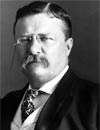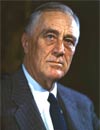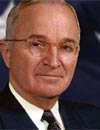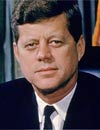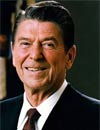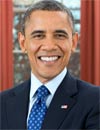
U.S. Presidents: More Musical Than You May Think
What presidents had "musical telent"? Find out now!I always find it fascinating to put music in the context of history. It is also enlightening to catch glimpses of U.S. presidents partaking of normal, everyday things - like music. What music was popular when presidents took office? Which presidents were, themselves, musical? What tunes have tickled their fancies? To help add some music to your Presidents' Day here in the U.S., here are some interesting musings and tid-bits to lend a soundtrack to the highest office in our land.
(Note: The dates in parentheses are when that president held office)
George Washington (1789 - 1797)
By his own admission, George Washington was not very musical. He was, however, a deft, graceful dancer - which probably meant he had a keen ear for music, as well as an appreciation for popular dance music of the day, like minuet's, reels, and other country dances. Despite is lack of music-making talent, the President's residence was full of music, thanks in large part to George's step-grand-daughter, Nelly Park Custis, who probably entertained George, Martha, and their distinguished guests with selections from her vocal and keyboard repertoire, including J.C. Bach's keyboard sonatas, Handel's "Water Music," and Haydn's "Mermaids Song;" as well as Robert Burns' poetry set to scores by Pleyel. Washington greatly appreciated European composers like Haydn, but he also highly revered some of our nation's first composers - particularly Francis Hopkinson, who wrote a set of 7 songs dedicated to George Washington upon his inauguration.
Thomas Jefferson (1801 - 1809)
Thomas Jefferson was perhaps one of our most musical Commanders in Chief. He began violin studies as a young boy, and with continued, dedicated practice throughout his life, music became, as Jefferson himself declared, "The favorite passion of my soul." While some scholars are uncertain as to the prowess of Jefferson's playing, his collection of sheet music at his home, Monticello, may suggest he was quite highly-skilled: Vivaldi, Handel, and some particularly difficult works by Corelli, to name just a few. Additionally, among the treasures at Monticello is a copy of Francesco Geminiani's "The Art of Playing on the Violin," from which Jefferson probably studied to refine his musical technique. Jefferson owned no fewer than 3 violins in his lifetime, including one travel-size, but sadly, the whereabouts of these instruments is unknown.
Abraham Lincoln (1861 - 1865)
When Abraham Lincoln first took office, with the young nation on the brink of a horrific Civil War, popular music of the day often reflected the deep divides between the North and South. Perhaps new hymns like "Abide With Me" provided a sense of solace for Lincoln as he struggled to preserve the union. Lincoln himself was not known for being particularly musical, but he enjoyed music immensely; "Blue Tail Fly" was a special favorite. His response to music of all kinds was often "intense and highly personal," with some noting that music might "mist his eyes and often throw him into a fit of deep melancholy." Only when Lincoln took office as president did he discover a deep love for the opera. In fact, he attended the opera at least 30 times while living in Washington D.C., with Charles-François Gounod's "Faust" topping his list of "faves." He also enjoyed the eclectic repertoire of the United States Marine Band, including waltzes, polkas, quicksteps, and even opera tunes.
Theodore Roosevelt (1901 - 1909)
Who doesn't love Ragtime? Theodore Roosevelt, who took office in 1901, may have tapped his toes to this delightful, infectious style of early jazz as he sat in the oval office. In fact, upon his daughter Alice's request, Scott Joplin's "Maple Leaf Rag" was first rendered at the White House in 1905. Nature may have been the music that stirred his soul the most, but perhaps when he took office in 1901, Teddy may have been humming popular tunes such as "All That Glitters Is Not Gold," "Ain't That A Shame," "Baby Mine," "Eyes of Blue, Eyes of Brown," and "I Hate To Get Up Early In the Morning."
Franklin D. Roosevelt (1933 - 1945) and Harry Truman (1945 - 1953)
Jazz was all-the-rage when Franklin D. Roosevelt first took office. Movies, musical theater, and radio popularized many tunes that may have helped FDR through some very troubling times, or that might have book-ended his popular, reassuring Fireside Chats - songs like Ethel Waters' "Stormy Weather", "Duke Ellington's "Sophisticated Lady," "Bing Crosby's "Shadow Waltz," and Dick Powell's version of "We're In The Money." Harry Truman took over upon FDR's passing, and he brought with him to the White House his love of playing the piano, particularly Chopin's Waltz in Ab, Op. 42, Beethoven's Piano Concerto No. 4 in G, and Johann Strauss's Blue Danube Waltz.
John F. Kennedy (1961 - 1963)
In keeping with Elvis Presley's 1961 hit, much of America couldn't help falling in love with John F. Kennedy as he took office in the same year. Other popular tunes in 1961 included "Will You Still Love Me Tomorrow" by The Shirelles, "Stand By Me" by Ben E. King, "The Lion Sleeps Tonight" by the Tokens, and "Hit The Road Jack" by Ray Charles. Some of JFK's favorite tunes may have been "Blue Skies," "I Love Paris" from Cole Porter's "Can-Can," "I Believe In You" from Frank Loesser's "How To Succeed In Business Without Really Trying," "September Song" as sung by Walter Huston, and of course, "Camelot."
Ronald Reagan (1981 - 1989)
Ronald Reagan took office in 1981 - the year of some much-beloved 80s tunes like Cool and the Gang's "Celebration," Dolly Parton's "9 to 5," "Chariots of Fire" by Vangelis, Neil Diamond's "America," and Journey's "Don't Stop Believin'." From the East Room to the White House lawn, the Reagans hosted performances from classical to country, from Broadway to Gospel, from the Boston Pops to the Beach Boys. Besides jellybeans, Reagan was fond of the music from "The Sound of Music," and even had some favorite classical pieces, such as "The Firebird Suite" by Stravinsky, "Porgy and Bess" by Gershwin, and "The Grand Canyon Suite" by Ferde Grofe.
Barak Obama (2009 - 2017)
For Barak Obama's inauguration in 2009, John Williams, the renowned film composer, wrote a string quartet featuring variations on the beloved Shaker melody, "Simple Gifts," and a diverse ensemble of some of the world's finest classical musicians braved the cold to inspire the world: violinist Itzhak Perlman, cellist Yo-Yo Ma, clarinetist Anthony McGill, and pianist Gabriela Montero. Later that evening, as the first couple danced the night away, Beyonce serenaded them and the nation with her rendition of Etta James' "At Last" - a fitting way to celebrate the election of our first African American president.
A Band of Presidents
Between the secret service, press briefings, international summits, and congressional gridlock, it's hard to imagine any of our presidents having time at all for musical pursuits. As it turns out though, Thomas Jefferson and Harry Truman weren't our only presidents who may have had musical talent. John Tyler (1841 - 1845) and Woodrow Wilson (1913 - 1921) both played the violin. John Quincy Adams (1825 - 1829) played the flute, and Warren Harding (1921 - 1923) was a self-proclaimed brass specialist, particularly the sousaphone. Richard Nixon (1969 - 1974) may be best known for some rather unfortunate circumstances surrounding his demise, but many may be surprised to learn that he was a classically-trained pianist,. Chester Arthur (1881 - 1885) knew his way around the banjo, and Calvin Coolidge (1923 - 1929) and Ronald Reagan both played a bit of harmonica. Bill Clinton (1993 - 2001) added a jazzy feel to the White House with the smooth sounds of his saxophone; and who can ever forget Barak Obama's soulful baritone, which was a balm for the soul in some trying times during his presidency.
Politics may divide, but there's no doubt that, as always, music manages to bring everyone to the same table. Presidents will continue to make history, and music will always play an integral role in their work, their impact, and their everyday lives.
Comments or Questions:
CMUSE. (n.d.). Thomas Jefferson as a violinist and advocate for music education. [link]
Hildebrand, D. (n.d.) Francis Hopkinson. George Washington's Mount Vernon. Colonial Music Institute. [link]
Huffington Post. (n.d.). JFK's 5 favorite songs and what they tell us about him. [link]
Metropolitan Museum of Art. (n.d.). Presidents of the United States of America." [link]
National Association for Music Education. (n.d.). The most musical United States presidents. [link]
Thomas Jefferson's Monticello. (n.d.). Personality Profile - Thomas Jefferson and music. [link]
Thomas Jefferson's Monticello. (n.d.). Violins. The Thomas Jefferson Encyclopedia. [link]
Thompson, M. V. (n.d.). Music. George Washington's Mount Vernon. Mount Vernon Estate and Gardens. [link]
White House Historical Association. (n.d.). Music in Lincoln's White House. [link]
White House Historical Association. (n.d.). Music in the Reagan White House. [link]
White House Historical Association. (n.d.). Musical events at the White House. [link]




